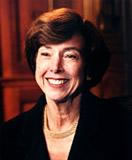
Overview
Carla Hills graduated from Yale Law School in 1958. She was president of the National Association of Women Lawyers in 1965 and was first offered an appointment as Assistant U. S. Attorney General in 1973 by Elliot L. Richardson. He resigned a short time later during the Watergate scandal and the offer was renewed in 1974 by his successor, William B. Saxbe. In 1975 President Gerald Ford appointed her Secretary of the Department of Housing and Urban Development. She returned to practicing law in 1978 and continued to do so through 1989, when she was appointed U. S. Trade Representative by President George H. W. Bush. During her years in the private sector she served on the Lawyers Committee for Civil rights Under the Law, co-chaired the Alliance to Save Energy, and acted as vice chair of the Advisory Council on Legal Policy of the American Enterprise Institute. As an advocate of free trade, she served as the primary U. S. negotiator of the North American Free Trade Agreement of 1994. Since serving as U. S. Trade Representative she has worked as a consultant and public speaker and was one of the founders of the Forum for International Policy. She was the third woman in U. S. history to hold a cabinet-level position.
About the Transcript
Carla Hills’ interview documents her experiences working as one of the first female lawyers in a upper-level government position. She begins by describing her decision to enter Yale Law School and then her work as an Assistant U. S. Attorney in Los Angeles, California, as well as her work with the American Bar Association. She discusses Elliot Richardson’s courting her for the position of Assistant U. S. Attorney General and then her employment by Richardson’s successor, William B. Saxbe. She was interviewed by Pendleton James, not by Barbara Franklin, but did her best to hire skilled female lawyers during her time in office. She describes her meeting with President George H. W. Bush and his announcement that he wanted to appoint her his U. S. Trade Representative. In this position, she was one of the leaders who launched the North American Free Trade Agreement in 1990, which eliminated all restrictions on agriculture and all tariffs on industrial goods. She says that since her time in the Attorney General’s office and as U. S. Trade Representative, the number of women in executive and corporate positions has skyrocketed. Hills recalls the restrictions placed on women in universities in the 1960s and how the ratio of men to women is much more equal today.